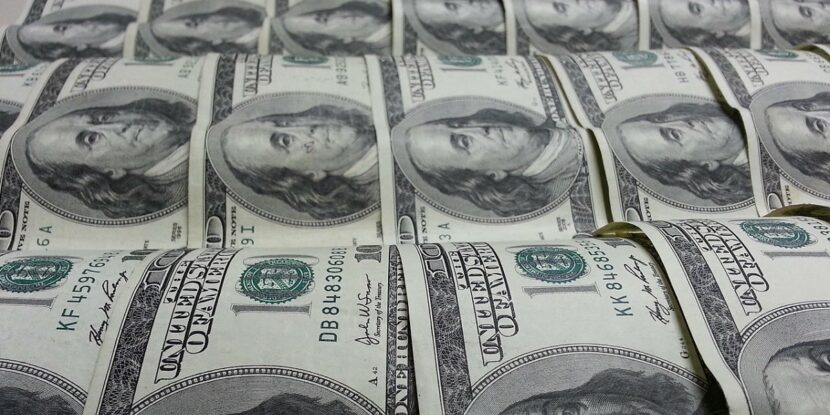This article was posted originally at the Epoch Times.
The one force that causes the most harm in our economy also happens to be the least well-known and understood.
While the left blames greedy corporations and individuals, and the right blames the government, it is in fact the collusion between the government and private banks that leads to problems like environmental degradation, unemployment, income inequality, and many more.
In the United States and most other countries, the government grants private banks the right to create money out of nothing and forces individuals to accept said money as legal tender and to use it to pay their taxes.
The Coinage Act of 1965 states, “United States coins and currency (including Federal reserve notes and circulating notes of Federal reserve banks and national banks) are legal tender for all debts, public charges, taxes, and dues.”
Today, the “notes” are mostly electronic credits in the form of bank deposits, but the same law applies. So much for legal tender—what about creating money out of nothing? Don’t banks take savers’ deposits and then loan them out to borrowers?
The short answer is no. Instead of taking in savings from companies and individuals, then waiting for a suitable borrower, banks use a simple accounting trick to create new money whenever someone applies for a loan.
Let’s assume you apply for a mortgage of $450,000. Once it’s approved, the bank simply credits your account with $450,000 in the form of a deposit, which you can then use to spend on your house. This is the bank’s liability. On the bank’s asset side, it credits itself with a loan of $450,000 to you, which you will pay back over the course of 30 or so years, plus interest.
For this process, no savings are necessary. The only thing the bank has to do from a regulatory perspective is keep a very low fraction of its assets in cash or balances at the Federal Reserve (Fed), so it can pay out some cash on demand if needed. This is often not more than 1 percent of its assets, hence the term “fractional reserve” banking.
The Root
The popular saying has it that money is the root of all evil. However, the original quote from the Bible would be more accurately applied to the process described above, wherein banks are allowed to create money out of nothing and charge you interest for the trouble: “for the love of money is the root of all evil.”
Money itself, of course, cannot be evil. It merely measures the value of goods and services produced and the value of capital saved. However, under the bank money monopoly, the new money created doesn’t measure production and savings, but actually changes them.
The creation of “money,” in the form of the loan and deposit, required nothing to be produced and nothing to be saved. The production only begins later, when the contractors start building the house—although even that is not guaranteed, given that many mortgages or other loans are used to buy up existing assets, which drives up prices.
Even loans that finance new construction alter the economy in unnatural ways: bankers’ prejudice directs production instead of consumer demand from their own savings. And the bank, which can repossess the collateral unless the loan is repaid, gets something for nothing.
The principle at work here is pure love of money—nothing more. The bank does not need to expend any effort but can “earn” the interest on the loan, which is the same as a private tax on the money supply. It is the equivalent of a few designated individuals being allowed to keep a money press at home, which they could then use to print cash, make loans, and charge interest against. Meanwhile, everyone else is forced to use those printed loans to make investments. Clearly, this is not fair.
The Problem
The ease with which banks can create money explains the recurring colossal blunders in risk management and loan creation, of which the subprime crisis is only the most recent manifestation. Because money is free, it makes sense for banks to loan out as much as possible. After all, they don’t have to do anything to source the funds, but get to reap the interest payments as the loans are repaid.
If the market for money were not completely cartelized by the government for the banks, even this perverse mechanism would have its limit, and would ultimately lead to the demise of the participating banks—just as what played out in the 2008 crisis.
However, because banks, regarded as too big to fail, collude with the government and sponsor politicians with campaign contributions, they can always rely on the government to bail them out when the house of cards collapses. This is not a problem of too little regulation, but instead of the wrong kind of regulations, perpetrating a systematic theft of public resources.
Even this is just the tip of the iceberg. Because the capital allocation process in this system is so flawed, the private sector is encouraged to spend funds on inefficient and unnecessary vanity projects—real estate is the most obvious, along with massive industrial overcapacity.
Because big corporations have better access to big banks, they have better access to this artificial “capital,” and they can therefore crowd out smaller players that may be able to service their communities better. Too much real estate development and industrial overcapacity also put the most strain on environmental resources.
The process leads to the centralization and bureaucratization of everything, not just the government. Big corporations, paying lower interest charges than their smaller competitors, end up providing the majority of goods and services. This is why we see the same brands and chains everywhere.
Because the money supply “tax” needs to be paid to private banks, corporations are constantly looking for ways to cut costs, which often means firing people and replacing them with robots.
Workers and ordinary consumers, on the other hand, get trapped. They have no choice but to meet high interest payments on credit card loans and mortgages, while the prices of goods, and anything they might invest in, shoot through the roof.
The Solution
Of course, it doesn’t have to be this way. If banks did not have the privilege of creating money out of nothing, and instead had to source their loans from real savings, their incentives would change immediately. It would also help if there were no government bailouts.
In that case, investment would equal real savings and would by definition be limited, because savings require a reduction in consumption. This is harder to achieve than simply printing money. Resources would, therefore, be economized. Opportunities for accumulating extravagant wealth, while still present, would also be reduced, and there would be a natural tendency toward a more even wealth distribution—not one engineered by a centralized bureaucracy.
If banks and borrowers had skin in the game, capital allocation decisions would be examined not according to the “love for money” principle, but rather according to how productive the investment would be.
More productivity means producing more with less, thus saving natural resources. Less capital investment would mean more room for humans to participate in the economic process. Prices for capital and goods would be more stable.
This is not a dream, nor a vision of Utopia. Honest banking and honest money have existed before in history. The first step to solving this problem is to be aware of the problem.


